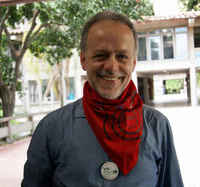Defining a common path in 2019–2021 to building the Mediterranean Network of Inhabitants
Cesare OTTOLINI, Global Coordinator, International Alliance of Inhabitants, Unione Inquilini, Italy
Defining a common path in 2019–2021 to building the Mediterranean Network of Inhabitants
Some key points for the proposal of strategies: the inhabitants should be the protagonists of the struggles and the proposals for r-existing (resisting neoliberal and racist policies in order to exist in the towns and territories).
A common roadmap towards the founding meeting in Marseilles, June 2019.
Presentation by IAI, background and activities that underlie the proposal.
It has been found that more than 500 million inhabitants from 22 countries bordering the Mediterranean are experiencing similar problems caused by local versions of the same neoliberal policies. The challenge and the dream is to bring together the inhabitants’ organisations from around the Mediterranean – struggling for the right to reside, in Mare Nostrum, to move, to struggle for the human rights of this and future generations. This sea has always been a mother to all people, but today we are witnessing a terrible situation: racist and nationalistic governments are turning the sea into a death trap for thousands of migrants.
The right to receive people with diverse backgrounds must be asserted. Africities should be the perfect occasion for launching this dynamic and convergences. We want to lay the foundation for this network so it will form the cornerstone of solidarity needed to make the necessary changes happen.
An initial overview shows us the common points that bring us together. The inhabitants are paying for the unfortunate choices of governors – the lack of resources due to municipal debt, the sovereign debt of states, the weight of the financial bubble.
The repercussions can be felt in:
- Transport, education and people
- Empty housings
- Unhealthy housings
- Finding solutions to evictions
- No rent control
Common topics:
- Participatory democracy is important for involving new arrivals and migrants
- Pay attention to cultural indicators
Note: Repression is becoming more and more serious. In Italy, Minister of the Interior Salvini has forced out the Mayor of Riace, a municipality which is an excellent example of the integration of migrants and residents.
Some key points for the proposal of strategies:
- The inhabitants must be the protagonists of the struggles and the proposals for r-existing (resisting neoliberal and racist policies in order to exist in the towns and territories)
- Participatory democracy: an essential tool as it could materialize the alliances between inhabitants’ organisations and local governments with policies based on paradigms that offer alternatives to neoliberalism
- Question resources: review and utilisation of all the available resources, conduct a citizen audit on the debt in order to release the necessary resources, managed by the local authorities as well
- Urban and strategic planning involves the inhabitants and the authorities of countries bordering the Mediterranean
Engagement in the struggles of the networks for the right to housing in Italy is led by the Unione Inquilini. This takes an internationalist approach as the problems have the same roots and are common in France, Spain, Morocco, Tunisia and other countries. It is once again necessary to take action in the Mediterranean to tackle this (e.g. struggling against forced evictions, unhealthy and real estate speculation).).
The political alliance with town councils and local authorities is important.
Which public policies are based on human rights?
Constitutionality and justiciability. We need to bring back these rights.
An audit of the debt is necessary. The city of Naples, for example, supports this as the weight of the debt is pressing on its inhabitants.
What does the Mediterranean Network of Inhabitants stand for?
The Mediterranean Network of Inhabitants is a proposal to the IAI with a horizontal structure, based on the inhabitants’ organisations, and is open to associations and experts, and alliances with academies and progressive local authorities, notably with the UCLG Africa.
We need to define:
- A charter of principles
- Guidelines
- A plan of action for implementation
What will be the large-scale activities? Who is going to implement and monitor them? What are the steps to be taken?
The Union for the Mediterranean is an intergovernmental organisation which includes the 28 countries of the European Union and the 15 states bordering the Mediterranean. It was established in 2008 and will be re-launched at a summit in Marseilles in June 2019.
It is important to think about the organisation and the meeting of the Mediterranean Network of Inhabitants in order to define and launch the network and create a plan of action for 2019–2021.
Over the next 10 months we will work according to our own agenda in order to make a success of the meeting in Marseilles in partnership with local social organisations.
Some areas of work for the network:
- Struggle and solidarity against evictions and homelessness
- Activities to control the real estate markets
- Political support for social housing, and cooperative, inclusive and eco-friendly housing (inclusion of migrants, against climate change, etc.)
Proposal for some large-scale activities:
- A session of the International Tribunal on Evictions for the Mediterranean
- Training sessions for the activists, in particular young people (Zero Evictions Camp in Sicily, etc.).
Good work, in solidarity.


